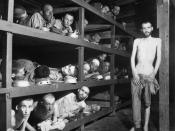Internees were civilians who were deemed to be potentially dangerous to national security. With the introduction of National Security Act 1939 during World War II, thousands of men, women and children were placed into internment camps all over Australia allowing the accommodation of Internees and Prisoners of War in Internment Camps. The people that were affected by the GovernmentÃÂs legislation were mainly Germans, Italians and Japanese that were Australian born of ÃÂenemyÃÂ alien descent or were arrested overseas and transferred to Australia. However, about 15% of Italian residents, 33% of Germans and almost all Japanese became internees for the duration of the war.
In order for the Government to keep records of the movement of ÃÂenemyÃÂ aliens they were required to register to their nearest police station and report regularly. Their travel was also restricted as they had to obtain formal leave before travelling outside their area of residence.
The ownership of cameras, radios, binoculars, motor-vehicles, motorboats, firearms, even carrier-pigeons were prohibited, unless you had received a permit.
Australian women married to foreigners automatically lost their British nationality. However, the Australian Nationality Act of 1937 gave them the alternative of renouncing their husbandÃÂs nationality and taking out British naturalisation for themselves. Ethnicity was a factor in how people experienced the war; the regulations were considered by civil libertarians to be draconian. The ÃÂonus of proofÃÂ was placed on individuals to show that they were not ÃÂenemy aliensÃÂ and should not be interned. Internment in Australia however, was kept to a minimum mainly due to practical concerns such as the cost of investigating every non-British person as well as the economic disadvantages of keeping non-British residents in custody; ultimately meaning that jobs would be left unfilled, causing a decline in business productivity.
During World War II, most internment camps had...



Good job
Interesting essay, I find the topic of internment during WW2 quite interesting.
0 out of 1 people found this comment useful.